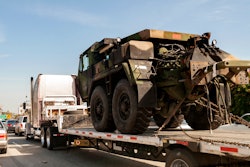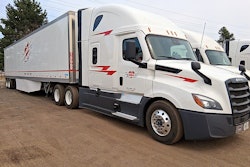In the wake of the 1996 Olympics bombing in Atlanta, the FBI initially suspected a security guard who had spotted a suspicious backpack and was helping evacuate the area when the bomb exploded. Investigators theorized that Richard Jewell had planted the bomb so he later could get credit for saving lives.
Jewell didn’t do it, but organizations sometimes deliver solutions to problems they really created themselves. Congress does this all the time. And the Federal Motor Carrier Safety Administration may be doing it as well.
In 1994, Congress demanded tighter procedures for verifying driver logs. FMCSA still hasn’t finalized the rules that were supposed to have been adopted by March 1996. The end is near, however. The White House now is reviewing a draft final rule on supporting documents.
FMCSA’s November 2004 proposal is an open-ended mandate that could prove burdensome for motor carriers. In effect, it would require that carriers maintain any paper or electronic document that could be used to verify logs. FMCSA says the rule might cost carriers $63.3 million over 10 years. The American Trucking Associations says it could cost more than $5.2 billion.
Perhaps FMCSA will be swayed by ATA’s call for a more moderate approach, such as the one in the original April 1998 proposed rule. But assuming the final rule looks much like the latest proposal, will you be forced to revamp your information systems and log-auditing processes at an extraordinary cost? Maybe not.
FMCSA published its revised proposal on supporting documents about two months after it issued an advance NPRM regarding electronic onboard recorders (EOBRs) in the wake of a federal court ruling that faulted the agency for failing to consider mandatory EOBRs. Automatic onboard recorders have been an alternative to paper logs for almost 20 years, but those systems are really just electronic versions of paper logs. Drivers and carriers still are accountable for retaining supporting documents under both current regulations and FMCSA’s proposed changes.
The EOBR envisioned by regulators and the industry is a different animal, however. It would greatly reduce the opportunity for data manipulation by drivers, arguably eliminating the need for supporting documents. In fact, one of ATA’s conditions for supporting EOBRs is that motor carriers using them would not have to retain supporting documents.
So why would FMCSA adopt new supporting documents regulations when it was considering a separate rule that could eliminate the need for supporting documents altogether?
One answer is that Congress mandated the supporting documents rule, so FMCSA must complete it. Perhaps, but FMCSA is not known for pushing through controversial regulations – even those mandated by federal statute. When it does complete them, it’s frequently due to intense pressure, which doesn’t seem to exist here.
Another possible explanation is that a burdensome supporting documents rule meshes well with a future regulation regarding onboard recorders. FMCSA could even include EOBRs as an alternative in its supporting documents rule, subject to the agency’s future certification of those systems. Whether onboard recorders are mandatory or voluntary, the agency could eliminate the supporting documents burden for carriers that use them.
Under today’s rules, that might not seem like much of an incentive or compensation. But suppose the new supporting documents requirements are a nightmare. Voila! Here comes the EOBR. Yes, it costs money, but just look at the money you are saving by not keeping dozens of time-stamped documents for each trip a driver makes. Besides, someone was going to make you install recorders anyway, so relief from supporting documents is really quite a benefit.
What a hero FMCSA would be, right?








